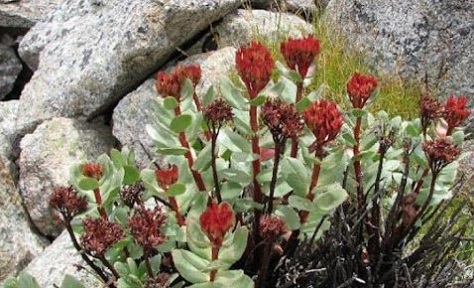Taiwanese study shows that Rhodiola crenulate extract can inhibit Zika virus and Japanese encephalitis virus
Nikhil Prasad Fact checked by:Thailand Medical News Team Jul 30, 2024 8 months, 3 weeks, 6 days, 22 hours, 14 minutes ago
Herbs And Phytochemicals: In a breakthrough that could have significant implications for global health, researchers from Taiwan have discovered that an extract from the traditional Chinese herb Rhodiola crenulata may offer powerful antiviral properties. This
Herbs And Phytochemicals news report delves into the findings of the study, which focused on the herb's effectiveness against the Zika virus (ZIKV) and Japanese encephalitis virus (JEV). Both viruses are known for causing severe neurological damage and, in some cases, death. The study was conducted by a team from the National Defense Medical Center in Taipei, Taiwan.
 Taiwanese study shows that Rhodiola crenulate extract can inhibit Zika virus and Japanese encephalitis virus
What the Study Found
Taiwanese study shows that Rhodiola crenulate extract can inhibit Zika virus and Japanese encephalitis virus
What the Study Found
The research team, including Zheng-Zong Lai, I-Chuan Yen, Hao-Yuan Hung, Chen-Yang Hong, Chih-Wei Lai, and Yen-Mei Lee, investigated the antiviral effects of Rhodiola crenulata extract (RCE) in a controlled laboratory setting. Their findings suggest that RCE can significantly inhibit the growth of both ZIKV and JEV. This article highlights the detailed mechanisms by which the herb works, offering hope for new treatments against these viruses.
Understanding Zika and Japanese Encephalitis
Zika virus first gained widespread attention during the 2015 outbreak in South America, which was associated with a dramatic increase in cases of microcephaly in newborns. This condition causes babies to be born with abnormally small heads and can lead to significant developmental issues. ZIKV can be transmitted by mosquitoes, from mother to child during pregnancy, and through sexual contact. While many infected individuals show no symptoms, the virus can lead to severe neurological conditions such as Guillain-Barré syndrome in adults.
Japanese encephalitis virus is prevalent in East and Southeast Asia and primarily spreads through mosquito bites. It can infect both humans and animals, with pigs and birds often serving as reservoirs. Although a vaccine exists, JEV remains a leading cause of viral encephalitis in endemic regions, with high fatality rates and long-term neurological complications for survivors.
The Power of Rhodiola Crenulata
Rhodiola crenulata, known for its anti-fatigue, antioxidation, and anti-inflammatory properties, has been used in traditional Chinese medicine for centuries. The plant thrives in high-altitude regions and contains over 160 identified chemical constituents, including salidroside, tyrosol, and gallic acid. These compounds have been linked to various health benefits, including anti-aging, anti-cancer, and antiviral effects.
Mechanisms of Action
The study utilized several advanced techniques to evaluate the antiviral properties of RCE. Researchers treated ZIKV and JEV infected cells with different concentrations of the extract and measured the impact on viral RNA levels, progeny yields, and viral protein expression. They found that RCE disrupted the viruses&am
p;#39; ability to bind to and enter host cells, thereby inhibiting their replication.
Notably, RCE's antiviral activity was dose-dependent, meaning that higher concentrations of the extract resulted in greater reductions in viral activity. The study also revealed that one of the herb's constituents, gallic acid, played a significant role in these antiviral effects.
Detailed Findings
The research team conducted a series of experiments to pinpoint exactly how RCE affects the viral life cycle. They discovered that the extract interferes with the early stages of infection, particularly viral binding and entry. In binding assays, RCE significantly reduced the ability of both ZIKV and JEV to attach to host cells. However, it did not affect the viruses' ability to enter cells once binding had occurred.
Further tests showed that RCE could inactivate the viruses directly, reducing their stability and rendering them less infectious. This effect was particularly pronounced at higher concentrations of the extract.
Implications for Treatment
These findings suggest that RCE could be developed into an effective antiviral treatment for ZIKV and JEV. By disrupting the initial stages of infection, the extract could potentially reduce the severity and spread of these viruses. Moreover, the identification of gallic acid as a key active compound opens the door for further research into its specific mechanisms and potential therapeutic applications.
Future Research Directions
While the results are promising, the researchers emphasize the need for further studies, particularly in vivo experiments, to fully understand the potential of RCE as an antiviral treatment. They also suggest exploring the extract's effectiveness against other viruses and investigating the benefits of combining RCE with existing antiviral drugs.
Conclusion
The study conducted by the National Defense Medical Center in Taipei offers a glimmer of hope in the fight against Zika and Japanese encephalitis viruses. By harnessing the power of traditional Chinese medicine, researchers have identified a potential new tool for combating these dangerous pathogens.
The study findings were published in the peer-reviewed journal: Pharmaceuticals.
https://www.mdpi.com/1424-8247/17/8/988
For the latest on
Herbs And Phytochemicals, keep on logging to Thailand Medical News.
Read Also:
https://www.thailandmedical.news/news/proanthocyanidins-and-methyl-gallic-acid-glucoside-from-saxifraga-plants-exhibit-virucidal-properties
https://www.thailandmedical.news/news/herbs-and-phytochemicals-emodin-derivatives-as-potential-weapons-against-sars-cov-2
